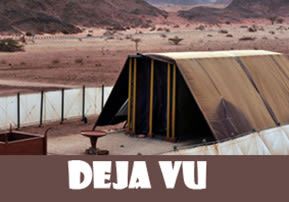
Pekudei: Deja Vu
As much as we try to fulfill the Divine will, our human frailties often prevent us from totally actualizing Hashem's intentions...

This week’s reading completes a cycle of a fascinating and, yet, puzzling description of the Sanctuary in the wilderness. Fascinating because of the elaborate details of what must have been a breath-taking architectural feat and also puzzling due to the question of relevance of the entire topic.
Three thousand plus years ago we built a temporary structure in the middle of the desert. As beautiful as the Tabernacle must have been, it’s difficult to understand the significance of this building for us today. What are we supposed to learn from the myriad details related to its construction?
When recounting the building of the Tabernacle in this week's reading, there is a phrase which seems highly redundant. After the completion of each individual section of the Sanctuary, the Torah reports that it was made “just as Hashem commanded Moses”. The holy Izbitza Rebbe (Rabbi Mordechai Yosef Leiner- 1801-54) explains that, in general, there is a gap between the ideal and the actual when performing Hashem’s commandments. As much as we try to fulfill the Divine will, our human frailties often prevent us from totally actualizing His intentions. The Torah testifies that the building of the Sanctuary was different and that our deeds were completely “in tune” with Hashem’s directives. Everything was done “just as Hashem commanded Moses”.
However, isn't it fair to assume that there were many commandments we performed, and performed well during our sojourn through the wilderness. Why was this accomplishment significant particularly concerning the Tabernacle?
The purpose of the Tabernacle was to create a place for the Divine spirit to rest in this world. Therefore, it was essential that all of the construction be done according to both the letter and the spirit of the law. Hashem’s approval of the work done for the Sanctuary reflected His willingness to now rest His presence within their midst, a fulfillment of the dream and hopes of the Jewish people.
But isn’t this accomplishment a thing of the past? How does this great achievement relate to us today?
The Talmud tells about the life of a fetus before it comes to this world. Our Sages inform us that while a child is living within his mother’s fetus, he is taught the entire Torah. Just before his birth, an angel comes and taps him on the mouth and all of the child’s learning is forgotten. From birth, he will need to begin again the process of acquiring Torah knowledge.
An obvious difficulty is raised on this incredible teaching. If the child is going to forget all of the Torah at the time of birth, why is he taught it at all? What is accomplished by giving him such a holy study partner and imparting him with so much wisdom, only to be forgotten at the time of birth? The classic answer given is that when the child will later develop and learn Torah, his learning will affect a sort of deja-vu experience. His soul will experience the clarity of the truths that are buried deep within his consciousness. His learning won't be in a vacuum and he will be able to access his earlier pre-birth knowledge, to reconnect to a higher awareness within him.
What is the purpose of the commandments we perform and the Torah we learn? Our Sages teach us that the purpose of our service of Hashem is to create a place, in this world, for His presence to dwell. As noble as that goal is, we could wonder how or if this is even possible. Can we ever imagine that this dream becoming a reality? We all deeply aware of our shortcomings and might imagine that such heights are ultimately unattainable. To respond to our doubts and concerns the Torah tells us that there was a time, thousands of years ago, when the entire Jewish people built a structure which was "just like Hashem commanded Moses". Just like the child in the fetus, there is a historical deja-vu that is imprinted in the collective consciousness of the Jewish people, that we were able to scale the mountains of trials and tribulations and to build a home from the Divine presence.
The building of the Tabernacle teaches us essential lessons of our potential and abilities to achieve closeness to Hashem. Yes, we can be the conduits for Hashem to rest in the world. Yes, our Torah learning and performing of His commandments can truly be the means for achieving a revelation of His loving presence. Yes, just as they built a home for Hashem, we too will build an eternal home in this world which Hashem will return to with the coming of Moshiach very soon.
* * *
Rabbi Dovid Charlop is on the teaching staff of the Neve Tzion Yeshiva in Telzstone, Israel. You can see more of Rabbi Charlop's articles here.







Tell us what you think!
Thank you for your comment!
It will be published after approval by the Editor.